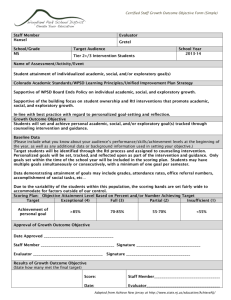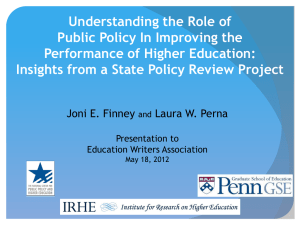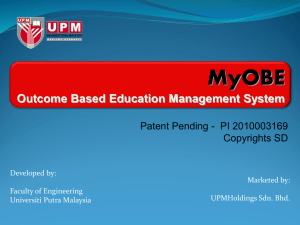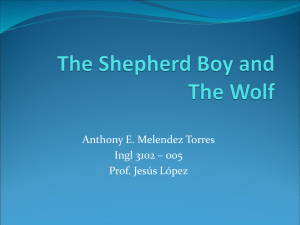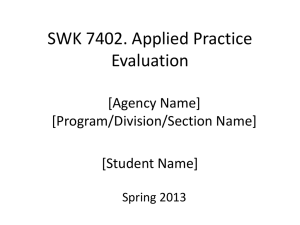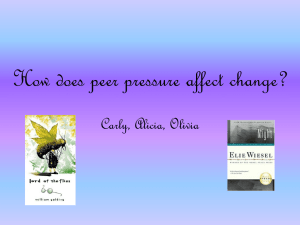Engaging_with_texts_1_Draft_2011-12
advertisement
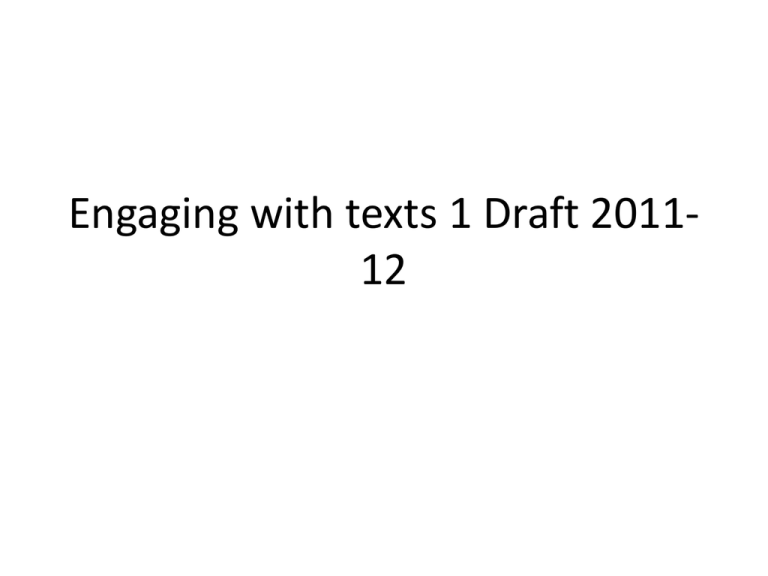
Engaging with texts 1 Draft 201112 Engaging with texts1 Reading Teacher & Reading Child Core 1 2011-12 The next 3 weeks 1 Reading teacher and reading child 2 Talking about books in groups –guided reading 3 Talking about books with the whole class – shared reading Objectives for mini module • To be introduced to the nature of reading and the reading classroom • To explore how reading helps children to make sense of the world • To understand how the teacher promotes the effective learning of reading through the contexts of shared and guided reading • To know how children’s comprehension and appreciation of literature can be developed through talk What about you as a reader? • My favourite book (children’s or adult) • Where I like to read Exploratory talk opportunity Why is reading important? Discuss with the people around you Why is reading important? • Children who say that they enjoy reading and who read for pleasure in their own time do better at school. Reading for enjoyment is positively associated with reading attainment and with writing ability (OECD 2002). Pupils who read for pleasure also demonstrate a wider general knowledge (Wells 1986), a better understanding of other cultures (Meek 1991), and more complex insights regarding human nature, motivations and decision-making (Cunningham and Stanovich1998, Bruner 1996) • From Scottish Executive Education Department, Literature Circles, Gender and Reading for Enjoyment (Allan et al., 2005.5) in Lockwood, M. (2008) Promoting Reading for Pleasure in the Primary School Reading helps children to make sense of their world • Michael Rosen 2009 • “They’re missing out on the incredible, brilliant wisdom of the world we have encapsulated in whole stories. The wonderful thing about stories is that you marry ideas and feeling in a sequence of events. Feelings or fear, of anger, of jealousy are wrapped up in characters, in creatures and beings, that we can understand. And what happens to them is that we follow them. In a sense they kind of hold our hands, and take us through disasters and triumphs. And we figure out who they are, and who we are. Nothing else does this.” • http://news.bbc.co.uk/1/hi/education/8236578.stm Success in reading? The latest figures from the Department for Education are for Key Stage 2. May's exams saw a higher percentage of students reaching the expected level of 4 all round. The percentages of children reaching level 4 - the expected level of attainment - are: • English 81% (86% for girls, 77% for boys) • Reading 84% (87% for girls, 80% for boys) • Writing 75% (81% for girls, 68% for boys) • Maths 80% (80% for girls, 80% for boys). But when you look at subjects combined - which is how children take them, after all - they show that only 67% reach level four in combined Reading, writing and maths. But, bad as that figure is, it has improved • http://www.guardian.co.uk/news/datablog/2011/aug/02/sats-ks2-results-listed-mapped • What Nick Gibb has to say – Read more! Government measures Gibb hopes will improve attainment levels of primary school children include a greater focus on phonics, the creation of academies in the primary sector and a reading check for all sixyear-olds to target those who are struggling. • • http://www.cypnow.co.uk/Education/article/1083088/third-11-year-olds-fail-meetstandards-core-subjects/ He added: "It is also critical that children read for pleasure. All primary school children should have a reading book on the go at home. Evidence from around the world indicates that the more a child reads, the better their attainment in all subjects, not just reading, will be.“ • The latest figures also show that one in 10 boys leaves primary school with a reading age of a seven-yearold. One in 14 boys leaves with a writing age at this level. The Key Stage 2 tests were taken by just over 500,000 11-year-olds. The percentage of pupils reaching Level 5 fell in reading by eight per cent and in writing by one per cent. Exploratory talk opportunity • What is a good reader? • What do you do while you read? • Tell the person next to you A good reader … • • • • • • Sees images Hears voices Asks questions Makes predictions Rereads if they get lost Thinks about the themes/premise/controlling idea • Empathises with main character • Makes connections • Talks to others about what they have read • Scans • Skims • Uses a range of reading strategies including phonics, • Knows how texts go – how they work and uses this knowledge • Knows about grammar and uses it • Uses the meaning of the text Exploratory talk opportunity • What do you do while you read? • Tell the persons next to you? What do children do when they read? • Read the story on your own • The paper must be held down on the desk The boy who cried wolf – comprehension questions • Describe the wolf • Why did Harry cry wolf? • What would have happened if his grandma had believed when he cried wolf? Some strategies you used • • • • • • • • Guessed and predicted what might come next Used previous knowledge Read right to left Used your finger so you could find where you were Used knowledge of phonics – how letters sound Used word shape and length Read forwards for meaning and then cross checked with the letters Used well known phrases Cues you may have used • • • • Semantic (meaning) Phonic (letters and sounds) Syntactic (grammar) pictures N.C. English AT 2: Reading • ‘Pupils should be taught to read with fluency, accuracy, understanding and enjoyment’ 2007 Attainment targets refer to: • • • • • • • • • Using a range of reading strategies: phonic knowledge, graphic knowledge, syntactic and contextual cues read fluently, accurately and independently establish meaning locate, summarise and use ideas and information read aloud express opinions and response to poems, stories and non-fiction (preferences, major events, main points, significant ideas, themes, characters, key features, refer to aspects of language, sentence structure and text structure, settings) use inference and deduction refer to text when explaining their views read a range of texts (fiction, poetry, drama, non-fiction) Simple View of Reading Exploratory Talk Opportunity Reading for pleasure • We need to provide an environment where children want to read • With the people on your table discuss ways to make reading a pleasurable experience you have seen in schools What is the most important classroom resource to promote reading? Clues below… • Slide on Teachers as Readers Reading Log • • • • • • • • • • • During the course of the module you are expected to read 50 children’s books. The books should reflect the range outlined in the National Curriculum English attainment target 2 but you may read beyond this. Try to include some children’s comics and magazines. Book logs can be kept electronically (you will find some examples at the back of this handbook) and printed out when needed or can be handwritten in a suitable notebook. Information for each book will include: Title Author Publisher, date etc Source (e.g public/university library, own collection Type of text (e.g. picture book, short stories, novel) Age group Theme *Evaluative review (brief summary of story, but also reflect on qualities of books) Suitability for reading aloud You might want to rate the book • See handbook for examples of reading log • You will bring the beginning of your Log to Week 8 Seminar to compare with peers. You may have 1-5 books in the log by then One Book • Oranges in No Man’s Land by Elizabeth Laird Directed task • In pairs write a guided reading plan Guidance for speaking and listening in reading circles Reading Journal You will participate in a reading circle during the 4 weeks when you will be doing the mini modules Engaging with texts and Cracking the code. All the students in your reading circle will read the same children’s book during the week and then discuss them in the seminar. It is helpful to complete a reading journal each week before you begin your reading circle. Thoughts about the characters, setting, themes, narrative Thoughts about the author’s use of language and/or visual imagery Photocopy this page 5 times and use the frame to structure your thoughts for the reading journal. Things that puzzled me Name of book Author My initial response to the book (e.g. things I liked/ things I disliked) Things that challenged me Other Next Week… • Bring your copy of Oranges in No Man’s Land to the next seminar • We will be using it
